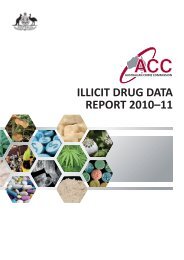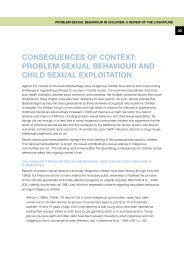Annual Report - COMPLETE - Australian Crime Commission
Annual Report - COMPLETE - Australian Crime Commission
Annual Report - COMPLETE - Australian Crime Commission
Create successful ePaper yourself
Turn your PDF publications into a flip-book with our unique Google optimized e-Paper software.
Decision-Making Powers and Powers Affecting Members Of The<br />
Public<br />
The ACC has powers which may affect members of the public. It has the power to:<br />
(a) require information from certain Commonwealth agencies;<br />
(b) receive information from a State, or an authority of a State under arrangements<br />
made by the Commonwealth Minister;<br />
(c) make arrangements with any other body or person to receive information;<br />
(d) apply for the issue of a search warrant, in some cases by telephone;<br />
(e) summon a person to appear before it to give evidence;<br />
(f) require a person to produce documents;<br />
(g) apply for a court order requiring a witness to deliver his/her passport to the<br />
ACC;<br />
(h) apply for a warrant for the arrest of a witness considered likely to leave<br />
Australia;<br />
(i) apply for a warrant for the interception of communications in respect of a<br />
telecommunications service; and<br />
(j) apply for a listening device warrant in its own right for the investigation of Federal<br />
narcotics offences and for certain State and Territory offences.<br />
External consultation<br />
The ACC Board exists independently of the ACC. It determines NCIPs, provides<br />
strategic direction to, and determines the priorities of, the ACC, authorises intelligence<br />
operations or investigations and determines the use of the ACC’s coercive powers,<br />
establishes task forces and reports to the Inter-Governmental Committee on the<br />
ACC (IGC-ACC) on the ACC’s performance. There are arrangements specified<br />
in the ACC Act for participation by the IGC-ACC. The IGC-ACC comprises the<br />
relevant Commonwealth Minister and a Minister from each participating state and<br />
territory. The Act also defines the role and responsibility of the Parliamentary Joint<br />
Committee on the ACC, comprising five Senators and five Members of the House of<br />
Representatives. Although not specifically provided for in the Act, the ACC consults<br />
with Australasian Police Ministers’ Council – Senior Officer Group, an advisory group<br />
to the IGC, and the Heads of Commonwealth Operational Law Enforcement Agencies<br />
(HOCOLEA).<br />
Categories of documents<br />
The following documents are available for purchase from the <strong>Australian</strong> Government<br />
Publishing Service:<br />
• <strong>Australian</strong> <strong>Crime</strong> <strong>Commission</strong> Act 2002, and<br />
• <strong>Australian</strong> <strong>Crime</strong> <strong>Commission</strong> Regulations.<br />
ACC ANNUAL REPORT 2003–04 I 153<br />
6G<br />
APPENDIX G: FOI STATEMENT




